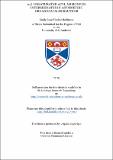α,β-unsaturated acyl ammonium intermediates in asymmetric organocatalysis
Abstract
This thesis details investigations into the generation and synthetic utility of α,β-unsaturated acyl ammonium intermediates using isothioureas as Lewis base organocatalysts to generate a range of heterocyclic products.
Initial investigations focussed on the development of a Michael addition-lactonisation protocol utilising α,β-unsaturated acyl ammonium intermediates (generated in situ from HBTM 2.1 and α,β-unsaturated homoanhydrides) and a range of 1,3-dicarbonyl nucleophiles. Products could be isolated as lactones or as ring-opened highly functionalised esters, giving good yields and excellent enantioselectivity. 1,3-Diketones were shown to generate a mixture of regioisomers and whereas 1,3-ketoesters afforded only a single regioisomer. A crystal structure of an α,β-unsaturated acyl ammonium intermediate was obtained that clearly demonstrated steric blocking of the Si- face of the alkene by the catalyst stereodirecting groups, therefore it can be postulated that enantiocontrol in the addition occurs by selective nucleophilic addition from the Re- face.
α,β-Unsaturated acyl ammonium species were then shown to participate in asymmetric annulation processes with benzazole nucleophiles to afford highly functionalised heterocyclic products, with both lactone and lactam formation observed. The relationship between nucleophile structure and process regioselectivity was investigated and it was demonstrated that benzothiazole and benzimidazole nucleophiles afforded preferential N-cyclisation to give lactams whilst benzoxazoles exhibited O-cyclisation to form lactones. It was also possible to influence the regioselectivity by changing the electronic properties of the acyl group (R’). Due to the reactivity of this class of nucleophiles it was possible to access products with quaternary centres. Palladium-catalysed cross coupling reactions were also successful on 3-bromo substituted lactams, demonstrating the potential for further derivatising these interesting heterocyclic products.
Finally, a cascade protocol was developed that employed Michael-Michael-lactonisation steps to give tricyclic products from enone malonate nucleophiles and α,β-unsaturated acyl ammonium intermediates (generated in situ by addition of HBTM 2.1 into acid chlorides). Interestingly, the reaction showed higher enantioselectivity at elevated temperatures (70 ˚C) and moderate regioselectivity (1,4- vs. 1,2-addition), which could not be improved after extensive screening. A range of lactones was isolated in moderate yields and enantioselectivity.
Type
Thesis, PhD Doctor of Philosophy
Collections
Items in the St Andrews Research Repository are protected by copyright, with all rights reserved, unless otherwise indicated.

